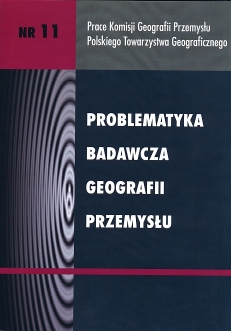Emerging network economy as a research field of geography of production
DOI:
https://doi.org/10.24917/20801653.11.3Keywords:
gospodarka sieciowa, geografia przemysłuAbstract
Geographical analysis of new socio-economic phenomena is often triggered by considerations made by researchers in the fields of economy and sociology. Network economy is an example widely presented in numerous works, e.g. The Age of Access: The New Culture of Hypercapitalism Where All of Life is a Paid-for Experience by Jeremy Rifkin. In the networked world, the ground of primary commerce is moving from geography to cyberspace - where GDP is now predominantly immaterial and based on ownership of intellectual property. Market transactions of buyers and sellers who exchange produced goods and services for profit are now being replaced by network relationships between suppliers and users - servers and clients. The new way of life is characterized by the dematerialization of goods (even of money) and their metamorphosis into pure services, the rise of networks, and a shift in commerce from production to marketing. An example of a significant method of claiming intellectual property rights and revenue from farmers were terminator seeds developed by Monsanto. The seeds were bio-engineered to be sterile, so that instead of harvesting seeds at the end of one crop season to be used for the next, the farmer would have no choice but to turn to Monsanto for seeds for the next year crop. Outsourcing has become a corporate substitution of internal ownership of physical capital and operations for access to resources and processes from outside suppliers. In the times of market economy, the localizability of tangible capital and production processes in geographical space was the decisive factor which allowed geographical analysis. Nowadays more sophisticated tools of geographical research should be developed to study economic phenomena in various networks, e.g. the new implementation of topology of network relations.Downloads
Metrics
References
Luttwak E. 2000, Turbokapitalizm. Zwycięzcy i przegrani światowej gospodarki, Wydawnictwo Dolnośląskie, Wrocław
Korten D.C. 2002, Świat po kapitalizmie. Alternatywy dla globalizacji, Stowarzyszenie Obywatel, Łódź
Kortus B. 1986, Wstęp do geografii przemysłu, PWN, Warszawa
Micek G. 2006, „Czynniki i mechanizmy koncentracji przestrzennej firm informatycznych w Polsce”, Instytut Geografii i GP UJ (rozprawa doktorska)
Rifkin J. 2003, Wiek dostępu. Nowa kultura hiperkapitalizmu, w której płaci się za każdą chwilę życia, Wydawnictwo Dolnośląskie, Wrocław
UNIDO Industrial Statistics Database INDSTAT 3, 1996 (i późniejsze), UNIDO, Industrial Statistics Branch, Vienna
Wiedermann K., 2006, „Czynniki i skutki rozwoju przemysłu motoryzacyjnego w skali lokalnej i regionalnej na przykładzie województwa śląskiego”, Instytut Geografii i GP UJ (rozprawa doktorska)
Downloads
Published
How to Cite
Issue
Section
License
Articles are published under the terms of the Creative Commons License (CC BY-ND 4.0; Attribution– NoDerivs).

